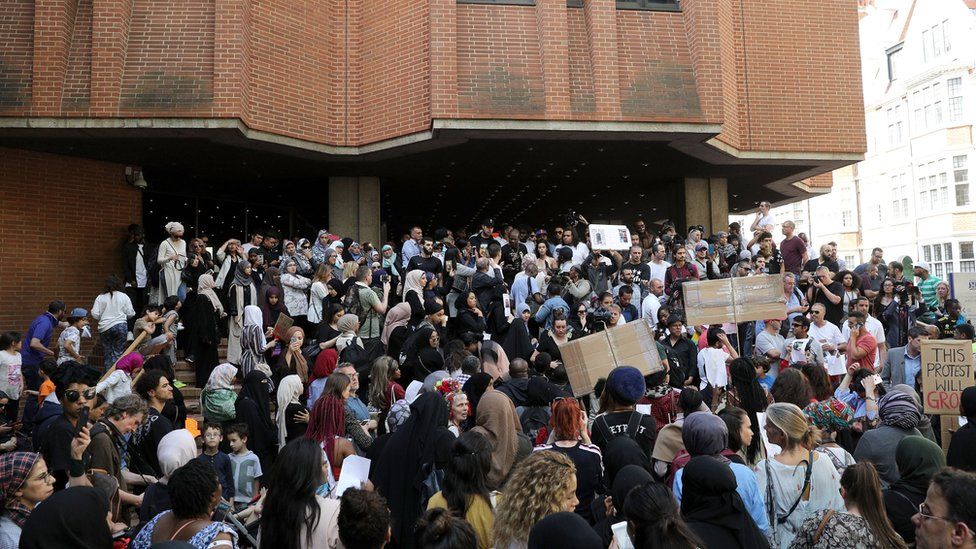London fire: Kensington council boss quits over Grenfell tragedy
- Published

The chief executive of Kensington and Chelsea council has resigned amid criticism over the borough's response to the Grenfell Tower fire.
Nicholas Holgate said Local Government Secretary Sajid Javid asked for him to go - this is denied by the government.
Mr Holgate said last week's fire in North Kensington, in which at least 79 people died, was "heart-breaking" but his presence would be a "distraction".
Residents had condemned the initial relief effort as "absolute chaos".
In a statement issued by the council on Wednesday, Mr Holgate, who has been in post since 2014, said it was the "highest priority" of the council to help families affected by the fire.
He said the communities and local government secretary had on Tuesday "required the leader of the council to seek my resignation".
However, a spokesman from the Department for Communities and Local Government denied involvement, saying: "The appointment of chief executives is entirely the responsibility of the local authority."
Mr Holgate said: "Despite my wish to have continued, in very challenging circumstances, to lead on the executive responsibilities of the council, I have decided that it is better to step down from my role, once an appropriate successor has been appointed.
"There is a huge amount still to do for the victims of the fire, requiring the full attention of this council and many others. If I stayed in post, my presence would be a distraction."
He added: "Whilst the public inquiry and other investigations will get to the truth of the causes of this tragedy and the management of its aftermath, I strongly believe that councillors and officers have always endeavoured to have the interests of our residents at heart and will continue to do so."
Nicholas Paget-Brown, the leader of the council, said it was with "regret" that he had accepted Mr Holgate's resignation.
He said: "The council has been grief stricken by the tragedy of the Grenfell Tower fire and has sought to provide the greatest level of support we can to victims.
"That is a huge challenge and Nicholas has led from the front in seeking to do this."
Shadow housing secretary John Healey told BBC Breakfast that Mr Holgate was "right to go".
He added: "He had to go. His council went awol in the days after this terrible fire - at a time when the victims, survivors, those families still looking for their family members who were missing, needed help on the ground and, above all, someone to reassure them and coordinate the relief and help efforts.
"The council were nowhere to be seen when I was down there the day after the fire - he had no option and he was right to go."
'No alternative'
Since the fire on 14 June, some Grenfell Tower families have been staying in hotels and B&Bs, and there were concerns that more permanent housing would be offered in other parts of the country.
And residents have said that Kensington and Chelsea council provided little support or information.
Government staff and other London boroughs were drafted in to help with relief efforts in the wake of the fire, with humanitarian assistance being provided by the west London borough of Ealing.
The Justice4Grenfell campaign group welcomed Mr Holgate's resignation.
The group's spokeswoman, Yvette Williams, told the Press Association: "He wasn't left with any alternative, I think it was the right thing for him to do, the community had been completely abandoned by the local authority."
Theresa May on Grenfell fire: "As prime minister I've taken responsibility"
The council's £8.6m refurbishment of the tower has also faced questions, with suggestions that new cladding fitted during the refurbishment could have made the blaze worse.
The refurbishment will be one issue looked at by a full public inquiry into the fire, ordered by Theresa May last week.
The PM, who is among those to have faced criticism after she failed to meet survivors in the immediate aftermath, has apologised for "State" failures after the blaze. She is expected to make a statement about the fire in the House of Commons on Thursday.
She told MPs on Wednesday: "People were left without belongings, without roofs over their heads, without even basic information about what had happened, what they should do and where they could seek help."
And the government announced that 68 social housing flats in Kensington Row, about 1.5 miles away from Grenfell Tower, would be made available to survivors.
The funeral of 23-year-old Syrian refugee Mohammed Alhajali, who was among the first victims of the fire to be named, also took place on Wednesday.
His family, who arrived from war-torn Syria, and Mayor of London Sadiq Khan attended the ceremony, called a Janazat, at an east London mosque.
Meanwhile, a number of inquests have been opened and adjourned, with the coroner finding:
- Retired lorry driver Anthony Disson, 65, died from inhalation of fire fumes
- Farah Hamdan, a 31-year-old nursery nurse, died from smoke inhalation
- Her husband, Omar Belkadi, 32, who worked as a courier, died from inhalation from fire fumes
- Abufars Ibrahim, a 39-year-old shopkeeper, had been visiting his mother in the tower. The coroner said he had been found at the foot of the building and died from multiple injuries
- Khadija Khalloufi, a 52-year-old married woman, also died from inhalation of fire fumes
Are you a Grenfell Tower resident? Share your views and experiences by emailing haveyoursay@bbc.co.uk.
Please include a contact number if you are willing to speak to a BBC journalist. You can also contact us in the following ways:
- WhatsApp: +447555 173285
- Tweet: @BBC_HaveYourSay
- Send pictures/video to yourpics@bbc.co.uk
- Upload your pictures / video here
- Send an SMS or MMS to 61124 or +44 7624 800 100